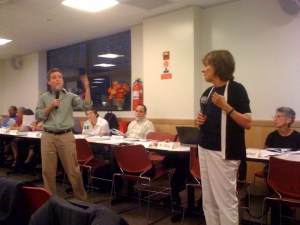Community Board Approves Its Disapproval of Riverside Center

Step one of Riverside Center’s public review is complete.
After four hours of debate in a special meeting devoted entirely to Extell’s 8-acre project, Community Board 7 on Thursday night finalized its own recommendation for the final frontier of the Upper West Side.
More technically, the board voted 36 to 2 to disapprove of the developer’s plan unless Extell builds according to CB7’s “modifications.”
And many modifications there were.
The board’s adopted report and resolution marks the completion of the first step in the lengthy public review process for Riverside Center—the southwest corner and remaining undeveloped parcel of the massive Riverside South project first constructed by Donald Trump over two decades ago. This mixed-use development is weaving its way through the city’s rezoning process that began in May, and—after several local public hearings—it will now head to the City Planning Commission and the City Council for further scrutiny.
Not surprisingly, CB7’s non-binding resolution disagrees with the developer’s application on most key issues, with the board seeking much stronger commitments toward school space and affordable housing, along with a less dense design that excludes an entire building in Extell’s plan.
“What an amazing process this has been,” CB7 chair Mel Wymore said in his opening remarks. “I want to thank you for coming, because you’re coming to listen,” he told the audience, explaining that, though the meeting is public, it’s not a hearing, and not open to audience comment.
George Arzt, media consultant for the developer, told The Observer prior to the meeting that he knew what to expect: “We all know what the outcome’s going to be, don’t we?”
And, considering the board’s stated “core principles,” there were few surprises.
Extell has agreed to fund the construction of the “core and shell” of 75,000 square feet of school space, leaving the remainder of costs—the rest of the school—to the School Construction Authority. The board’s proposed modification asks that the developer fully fund the construction of 151,598 square feet of school space.
The report, citing the Draft Supplemental Environmental Impact Statement, says that by 2018, schools within a half-mile radius of the project will be over capacity unless the 151,598 square feet is built. (The estimated cost to construct state-of-the-art facilities, the report says, is $53-68 million.)
In the density battle, the board recommended that the developer restrict total density to 2.4 million square feet, and remove an entire building to create more open space.
Another major discrepancy between Extell and CB7 is the amount of affordable housing, with the developer agreeing to make 12 percent of units affordable for only 20 years, while the Board demands 30 percent of floor area be affordable, permanently.
“CB7 endorses the initiatives of the City government,” the report says, citing precedent of Atlantic Yards and the New Domino Sugar Factory development. (The City Planning Commission has in fact already hinted that it wants to see more affordable housing in Riverside Center.)
Debating everything from the organization and size of underground garage facilities to the direction of vehicular traffic on specific streets, the board faced many roadblocks that delayed the final vote until close to 10:30 p.m. (This gave chair Mr. Wymore many opportunities to hand out chocolates to hungry members.)
CB7 member Charles Simon, debating whether to demand that all affordable housing be on site, acknowledged the complicated role of the community board in the process. “As a strategic matter, the smart thing to do is to ask for everything we can ask for while remaining credible, understanding that lot of negotiation will take place after we’ve had our say.”
One major sticking point was the potential, and likely expensive, relocation of Miller Highway underground.
“We’re asking for an awful lot from this developer,” said member Richard Asche, discussing possibilities of the relocation of the highway.
“I don’t think we are asking enough,” later responded member Klari Neuwelt, citing the importance of park space in this area.
The group eventually agreed to recommend that the developer make a substantial contribution to potential future highway reconfiguration.
Near the end of the meeting, Mr. Arzt, representing the developer, passed around a hand-written note to the few reporters in attendance with his official statement of discontent: “While we recognize the Board’s hard work, they clearly do not recognize the difficulty in developing projects in this uniquely challenging economic environment. However, this is just the beginning of a long process. We look forward to the next round of the process.”
He reiterated to The Observer his frustration: “They did not prioritize their requests. They gave equal weight to … items, without any sense of what they cost. They completely ignored the burden of cost.”
But local City Councilwoman Gale Brewer told The Observer that she couldn’t be prouder of CB7. Responding to claims that the board has not acknowledged financial realities of development with its recommendations, she said, “That’s an understandable position, but the community board has done its homework.”
She added of the report, “This is perhaps the most thoughtful … transparent document I’ve ever seen.”
slevin@observer.com



